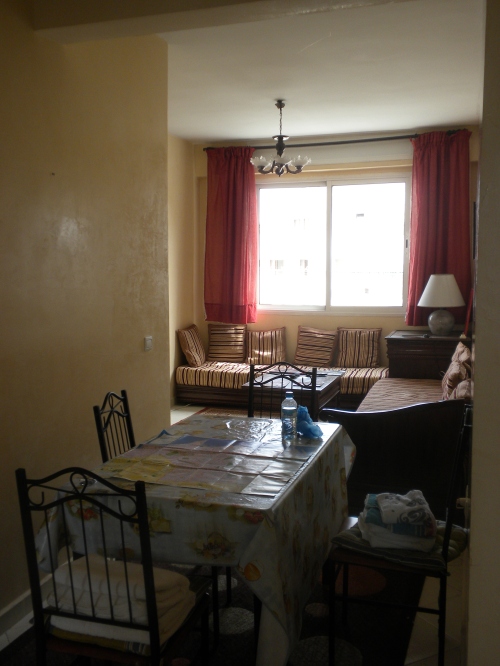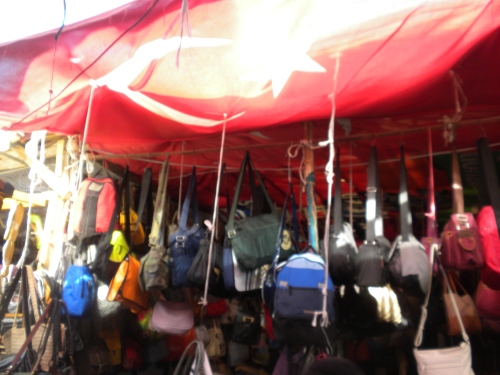***Apologies for the length of this post. If—spoiler alert—you just want to see pictures of my new apartment scroll all the way down.***
The month I’ve spent so far in Morocco can be divided into phases of figuring out several logistical issues. First I was officially accepted to the Masters program—success! A week later I finally started to receive my scholarship funds, which kicked off my year as an Ambassadorial Scholar. With enough money now to put down a security deposit and pay rent, all I had left to worry about was finding an apartment in Casa.
Oh boy, did I worry.
In Chicago, I’m an adult. I call my mom from time to time when I’m confused about something, but generally I manage to take of business on my own. I’m able to get around town, find and rent an apartment and stay on top of my bills like a big girl.
This probably goes without saying for those of you who have lived abroad, but in other places, things are different. An adult who does adult things with adult efficiency at home feels more or less helpless in another country. And I speak French, which makes getting things done around 200 times easier.
At first, I had a few leads from friends, so I wasn’t too stressed out. This period of the apartment search can be described as Waiting by the Phone.
Sometime around Eid, though, I crossed that fuzzy threshold when you start to feel like you’ve been imposing on a nice family for far too long. Problem was, of course, that it’s hard to get anything done when everyone is celebrating the holidays. I like to think of this period as, “man I hope something comes through from my friends because I have no idea what else to do.”
I got the phonecall, and visited a very nice one-bedroom apartment a few days later. A move-in date was set and, relieved, I announced to a few friends that I’d have a home by the weekend.
But then, as each person I told reacted in shock at the price—more than what I paid in Chicago—I started to have some doubts… Do I even need my own place or can I share? Should I have looked for something closer to the bus line that will take me to the Ben M’Sik campus?
My host mom, sensing my deflation and sensitive to my concerns about cost, suggested that I might stay a little longer so that I could find something better.
This hadn’t even crossed my mind, and here’s why. Keeping in mind that my host family has been incredibly generous, know that I’d been living in their house for three weeks. I’d been around for almost every meal, often requiring preparation of a meal even when the rest of the household was fasting. I was around for Eid, when the house was crowded with actual family members. I went out a couple of times with some Rotaract friends and since I rely on them for a ride home my host mom had to wake up to let me in the house when I came home late.
Given all that, I was deeply touched by my host mom’s invitation and took her up on it, resolving to do everything I could to get out of their hair ASAP, and stay out of the way in the meantime.
But how do you go about finding an apartment in Casablanca anyway?
You can scan the classifieds, where I had no luck. Most places were too expensive, and I was dead set on finding a place in a hip neighborhood where I know for a fact there’s a bus that takes me to Ben M’Sik. (Trust me, there are more ‘tobiss’ posts to come…) Sometimes the places were already rented out, or not furnished.
I had one extremely frustrating phonecall with a very racist prospective landlord who, in addition to having no tolerance for africans, apparently doesn’t like to rent to students, either. (I hesitate to mention this here because I want to be careful when I broadcast that, well, Morocco “has issues” when it comes to its sizeable population of sub-saharan Africans. I’m hoping to gain a nuanced perspective on the matter, which I’ll share on this blog at some point.)
On Sunday, wanting to visit the neighborhood where I’d be checking out an apartment, I set off in the direction of Maarif extension and promptly got lost in the very crowded working class neighborhood of Derb Ghallef…right after a local team won a soccer match…as it started to rain. I was simultaneously disappointed at myself for being so freaked out by a neighborhood where thousands of people live, and proud of myself for admitting this difficult truth. Kathleen is used to “certain comforts”—not many, I might defensively add, considering I’m from the US—but I won’t be Thoreau-ing this next year.
Discouraged and feeling the pressure to leave my host family’s home, I email blasted my friends, became penpals with other people in Casa looking for apartments, and talked with everyone about my predicament.
Pouring my heart out to strangers is how I ended up finding a two bedroom apartment in the building where friends of a good friend of mine live. As is pretty typical in a word-of-mouth housing market (I now know), we asked “a guy” who lives in the building to show us an apartment upstairs. These “guys” are samsars who work as informal real estate agents—they hear of an opening, they show you around, and of course take a commission.
You just have to talk to the right person. This is generally true in all kinds of situations, but it’s especially true in Morocco in all kinds of situations.
I found my roommate the same way. Not to bore you with the details, but I do want to give you an idea of the chain of contacts and helpful people who led me to her: I “met” a Casaouia online at www.expat-blog.com, where I was hanging out looking for housing; she was looking for a language partner; I told her I’d be happy to meet, once I was settled, and by the way did she know of any places for rent? She didn’t but sent me a long email with tips and contact information for a guy who works for a student network; meanwhile I found an apartment; the friend of the expat-blog.com woman contacted me via facebook and told me that a French student was looking for a place; Frenchwoman and I corresponded by email and I was happy to learn that she is a nonsmoker; we met for coffee and hit it off.
The Apartment
Last night my roommate and I met with our landlord to go over the details one last time. When we were all in agreement, the landlord said, “Alors, on dit bismillah?” (In French, except for the last part: Alright, so, shall we say bismillah?) Actually, bismillah is something you say right as you start something-your first bite of a meal or as you get into a car to go somewhere, for example. It hadn’t occurred to me that we might say this as we signed a lease, but it was a nice touch of officiality.
Now that I’ve landed what feels like the perfect place, at the right price, with a wonderful roommate, I’ll admit that it might seem to have been irrational of me to stress out so much (so much!) about finding an apartment. However, friends agree that I got lucky. This seems to be a recurring theme in my Casa adventures, actually.
Our apartment is furnished, and includes such rare comforts as: a TV with cable, a washing machine, and a patio. Those are never guaranteed when renting even a furnished apartment, but our landlord rents mostly to foreigners who stay in Casa for a few weeks. Foreigners with usually deeper pockets and particular needs.
And now, having talked up this place and walked you down the path that led me to it, without further ado, here are some pictures:

Our dinner table sits in a hall that leads to a Moroccan-style living room. Moroccan-style refers to a certain style of couches that wrap around the wall.
—

Kitchen is well equipped with dishes and appliances.
—

A full size bed. I must be dreaming…
—

Do I really have to explain that this is the picnic table on the terrace with the view of the neighborhood of my dreams?

















